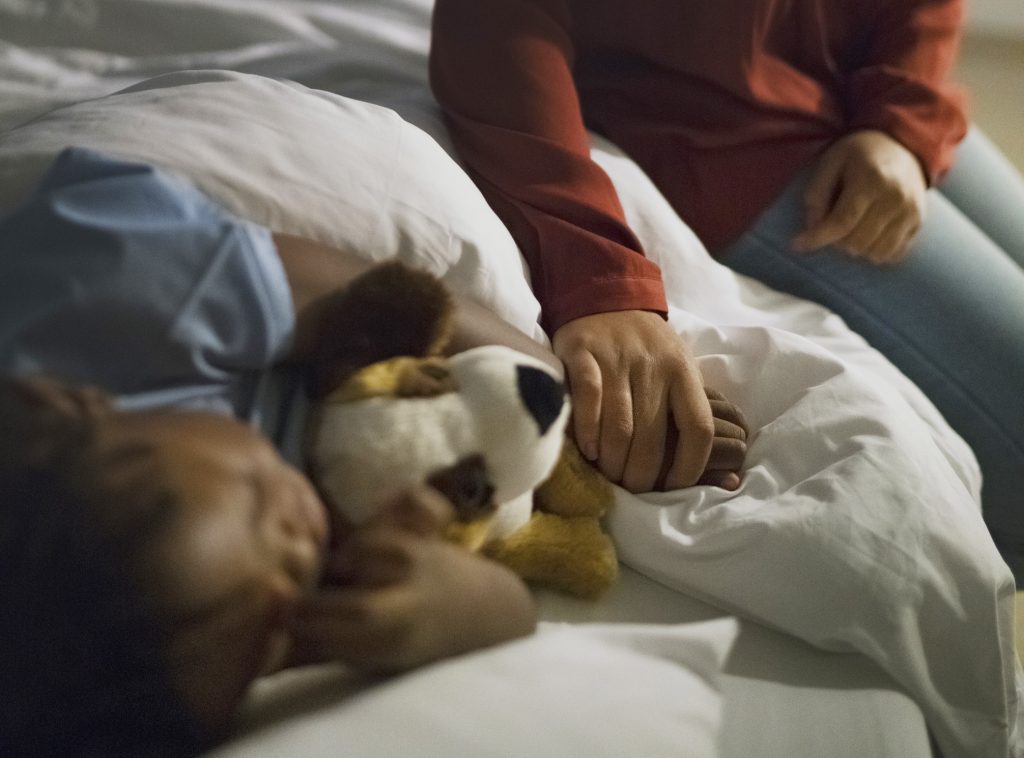When to Take Your Child to the Emergency Room

One of the most difficult decisions we face as parents is what to do when our kids get sick. Knowing what can be treated with medication, when a doctor should be seen and when it’s time to go to emergency or call 911 isn’t knowledge we’re born with. And when our kids are too young or too unwell to accurately describe their symptoms, we feel like we’re flying blind. And it’s terrifying.
A child’s illness takes our everyday parenting anxieties and puts them on steroids. We ask ourselves: Is this normal? Should I be worried and if so, how worried? And what should I do? And while you’re fending off advice from everyone and their mother, your anxiety is slowly building and you’re weighing the pros and cons of both under and over-reacting.
We know. We’ve been there.
Even among medical professionals opinions can vary as to what requires a call to the pediatrician and what deserves more urgent action so we’ve compiled a few guidelines to help you decide what to do when your child is unwell.
When to Call the Doctor:
According to Toronto’s Hospital for Sick Children, you should always call the doctor if your baby under three months of age has a fever. A call to the doctor is also recommended if your child has a cold with a fever that lasts more than one or two days, with low appetite, vomiting, diarrhea, or lack of playfulness, or if the fever is over 39 C or 102 F, or if the fever keeps coming back.
The Cleveland Clinic, one of the largest and most respected hospitals in the United States, recommends a call to your baby’s doctor or pediatrician if s/he:
- Refuses to feed for multiple feedings in a row
- Has diarrhea and vomits more than usual
- Has a cold that doesn’t improve or gets worse
- Has a rash
- Has signs of dehydration (including a decreased number of wet diapers and/or if the soft spot on the top of the head has shrunk)
- Has ear drainage
- Will not stop crying
- Has blood in vomit or stool
- Has difficulty breathing
- Has any type of poisoning
- Has bleeding that cannot be stopped
- Is not able to move
- Has yellow skin or eyes
- Sleeps more than usual or will not wake up
- Is limp.
For older children, most family medical specialists suggest a call to the doctor is always warranted when a child is older than three months and has a fever that’s lasted more than three days. As well, parents should call the doctor when their child is suffering from a cold and:
- Develops an earache
- Becomes unusually cranky, sleepy or fussy
- Develops a skin rash
- Experiences laboured or rapid breathing
- Experiences a cough that becomes persistent or severe
When to Go to Emergency:
The Hospital for Sick Children advises that the following circumstances require immediate consultation with a doctor. If a doctor can’t be reached you should take your child to the closest emergency department right away when:
- The child has diarrhea and vomiting AND has no tears, dry mouth or is not urinating
- A baby under three months of age has a fever over 38.5 C or 101 F
- Your child has difficulty breathing
- Your child has a rash that doesn’t turn white when you push on it
- Your child has a fever or is difficult to wake or is very sleepy
In addition, the University of Michigan’s Head of Pediatrics further recommends an emergency visit in the case of:
- Severe allergic reaction
- High fever with headache and stiff neck
- Sudden loss of sight, speech or movement
- Heaving bleeding or deep wound
- Serious burn
- Coughing or throwing up blood
- A fast heartbeat that doesn’t slow down
- Rectal temperature that’s higher than 100.4 F in infants less than two months old
When to call 911:
In the following instances, medical professionals recommend immediately calling 911:
- Choking
- Severe difficulty breathing
- Head injury and unconsciousness
- Injury to neck or spine
- If the child isn’t breathing and is turning blue
- Severe burn
- A seizure lasting more than five minutes
- Bleeding that can’t be stopped
Webmd recommends a 911 call in these additional instances, often because treatment can begin immediately upon arrival or in the ambulance:
- Respiratory distress (caused by conditions such as asthma, choking, infection or pneumonia)
- Broken bones (when the break is severe and pain cannot be managed, the bone is sticking out of the skin, the injury involves the head or neck, consciousness is altered)
- Vomiting and/or diarrhea (when the child is unresponsive and/or there is severe cramping and unrelenting abdominal pain)
- Febrile Seizures (that last more than three to five minutes and/or when the child is turning blue and/or his mental state does not return post-seizure
- Falls (that lead to vomiting, unconsciousness, complaints of numbness or tingling or if internal injuries or injury(ies) to the neck and spine are suspected)
- Cuts or Bleeding (when there is a known bleeding disorder, or the bleeding can’t be stopped)
- Possible poisoning (when the child is unresponsive, or poison control advises it)
Remember, internet sleuthing should never replace the advice of a medical professional.
YOU know your child best. Never ignore your maternal instincts and don’t be afraid to sound the alarm if you know something isn’t right.
















